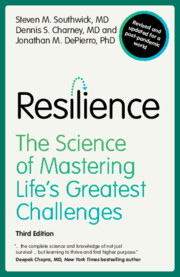Book contents
- Reviews
- Resilience
- Resılience
- Copyright page
- Contents
- Acknowledgments
- 1 What Is Resilience?
- 2 Optimism Belief in a Brighter Future
- 3 Face Your Fears
- 4 Moral Compass
- 5 Religion and Spirituality
- 6 Social Support
- 7 Role Models
- 8 Mind Your Body
- 9 Challenge Your Mind
- 10 Cognitive and Emotional Flexibility
- 11 Meaning, Purpose, and Growth
- 12 The Practice of Resilience
- Resilience Facing Death: A Tribute to Dr. Steven M. Southwick
- Abbreviations
- References
- Index
6 - Social Support
Published online by Cambridge University Press: 01 August 2023
- Reviews
- Resilience
- Resılience
- Copyright page
- Contents
- Acknowledgments
- 1 What Is Resilience?
- 2 Optimism Belief in a Brighter Future
- 3 Face Your Fears
- 4 Moral Compass
- 5 Religion and Spirituality
- 6 Social Support
- 7 Role Models
- 8 Mind Your Body
- 9 Challenge Your Mind
- 10 Cognitive and Emotional Flexibility
- 11 Meaning, Purpose, and Growth
- 12 The Practice of Resilience
- Resilience Facing Death: A Tribute to Dr. Steven M. Southwick
- Abbreviations
- References
- Index
Summary
One of the most effective resilience factors is all around us - the people in our lives. Even during the COVID-19 pandemic, which forced the world into lockdown, we found creative ways to reach out to one another. We describe the “tap code,” an ingenious way that Vietnam War POWs, often kept in isolation, supported each other and share informational vital for their mutual survival. We summarize research showing that social support can lower the risk of developing depression and postraumatic stress disorder; and that its opposite, feelings of loneliness, increases one's risk of developing a range of different illnesses. In our busy lives, building and keeping up our social support network takes effort, but it is an essential lifeline.
- Type
- Chapter
- Information
- ResilienceThe Science of Mastering Life's Greatest Challenges, pp. 105 - 122Publisher: Cambridge University PressPrint publication year: 2023

